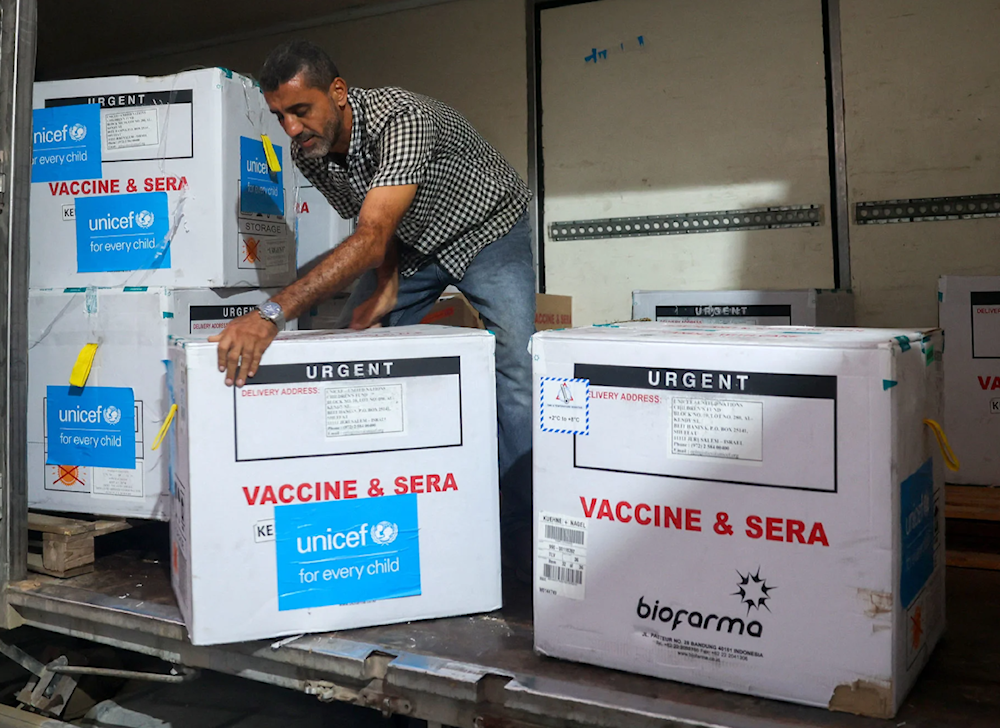Hamas vows cooperation with 3-day pauses for polio vaccine drive
A senior WHO official says "Israel" and Hamas have agreed to three separate, zoned three-day pauses in fighting in the Gaza Strip to allow for the polio vaccination campaign.
-

A worker unloads a shipment of polio vaccines provided with support from UNICEF to the Gaza Strip through the Karem Abu Salem crossing at a depot belonging to Gaza's Health Ministry on August 25. (AFP)
The Israeli occupation (IOF) and Palestinian Resistance movement Hamas have agreed to three separate, localized three-day ceasefires in the Gaza Strip to enable the immunization of around 640,000 children against polio, WHO official Rik Peeperkorn announced on Thursday.
The WHO's lead representative for the Palestinian territories announced that the immunization campaign would begin on Sunday and explained that the arrangement was for the breaks to occur between 6 am and 3 pm.
The campaign is scheduled to begin in central Gaza with a three-day ceasefire then move to southern Gaza for another three days, and finally to northern Gaza. Peeperkorn further stated that there was an agreement to prolong the humanitarian pause in each to a fourth day if needed.
Earlier, refuting a previous announcement of reaching a similar agreement, Israeli Prime Minister Benjamin Netanyahu rejected, in a statement, the claims made by the media citing a senior US State Department official that "Israel" agreed to a "pause in the fighting in order to administer polio vaccines."
Netanyahu insisted on reaffirming that the Israeli occupation's security cabinet has rather only agreed on the "allocation of certain places in the Gaza Strip."
In response, some Palestinians in the Gaza Strip mocked the US and its international efforts, saying that "Israel" and the US are afraid Palestinian children would be bombarded to death unvaccinated.
This highlights the gap between the international community's portrayal of its efforts as successes and its actual failure to ensure Palestinians in the Gaza Strip and across occupied Palestine are granted their basic rights.
10-month-old infant in south Gaza with poliovirus partially paralyzed
Health experts have repeatedly raised concerns about the spread of waterborne diseases following the partial paralysis of a 10-month-old baby who contracted polio, marking Gaza's first case in 25 years.
"Very sad. #WHO confirms that a 10-month-old baby in Gaza is now paralysed due to #Polio."
— Al Mayadeen English (@MayadeenEnglish) August 23, 2024
The UN has identified the first polio case in Gaza in 25 years, with the disease paralyzing a 10-month-old baby, according to senior UN officials.
Philippe Lazzarini, who leads the #UN… pic.twitter.com/tcsTTxOmVd
This comes after the Health Ministry in Gaza reported on August 17 the first incidence of poliovirus in the Gaza Strip's southern governorates.
According to a press statement, the instance involved a 10-month-old infant who had not received any vaccination for polio in the city of Deir al-Balah after the newborn exhibited symptoms identical to those of polio as suspected by doctors. Tests in Amman indicated that the infant had contracted a type of vaccine-derived poliovirus (VDPV).
The ministry confirmed that it would launch a critical polio vaccination campaign in the coming days aimed at children under the age of ten, noting that 1,200,000 type 2 polio vaccine doses had been secured in collaboration with the United Nations Children's Fund (UNICEF).
Work was underway to secure an additional 400,000 doses, it maintained.
It further stressed, however, that the Strip is facing a severe health crisis due to the ongoing Israeli aggression, which has led to a lack of basic hygiene, sanitation, and clean drinking water. This has created conditions conducive to the spread of epidemics, including water-borne diseases like VDPV. The situation has resulted in waste accumulation on streets and around shelters, further exacerbating the health risks.
The international community and health organizations are being urged to intervene urgently to stop the aggression and address the immediate healthcare needs of Gaza's population. International bodies are also called to take action to restore safe water and wastewater systems, manage waste disposal, ensure fuel for water pumping, and facilitate the unrestricted entry of medical and hygiene supplies into the Strip.

 4 Min Read
4 Min Read








